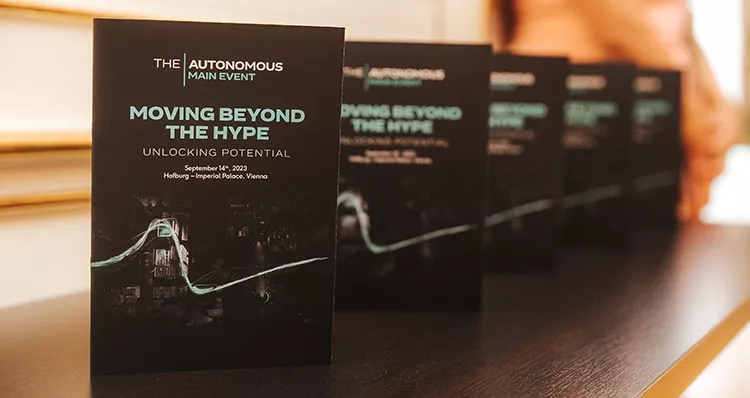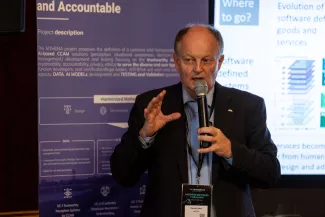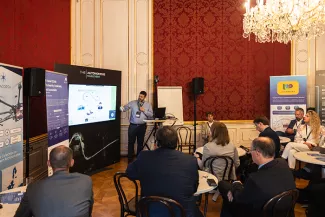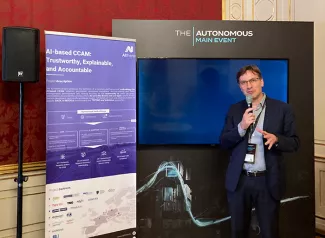
Image ©Philipp Lipiarski
The Autonomous is a global community on autonomous driving, co-founded by TTTech Auto. The Autonomous main event, which took place on September 14 in Vienna, was dedicated to the motto “Moving beyond the hype”. Dirk Linzmeier, CEO of TTTech Auto, explained the theme in the following way in a recent interview: “A couple of years ago, there was a big hype around the topic of autonomous driving with lots of startups being founded and now everyone involved is starting to realize that it’s taking a little bit longer than expected to make autonomous driving a reality. In my opinion, current initiatives are more solid and much more based on reality. Autonomous driving is evolving, but much more gradually and step-by-step.”
As is now almost traditional, one workshop at the event was dedicated to the European research and development community, led by TTTech’s Innovation Projects and Funding Management team. In the workshop, titled “: Autonomous Driving and future mobility trends in R&D”, the European Union’s general strategy and approach to autonomous driving were presented, along with an update on several EU-funded research projects currently investigating the subject.

Reiner John, Coordinator Research Funding in Corporate Strategy at AVL, talked about sustainable mobility and technology convergence, specifically the synergies it takes to transform our ecosystems towards autonomous vehicles. He stressed the importance of collaboration, not just on a technological level, but also on a societal level, reminding the audience that the acceptance of a new technology largely depends on the value it contributes to a community. Reiner illustrated how the A-IQ-Ready project contributes to this objective by applying disruptive technologies, such as Quantum Sensing, Neuromorphic Acceleration, and AI in multi-agent systems to build up a digital backbone for the Society 5.0

Dr. Mohammed Abuteir, Innovation Projects & Funding Manager at TTTech, reported on the achievements of the EcoMobility project – in particular, focusing on the relevance to the workshop motto. EcoMobility seeks to harness collaboration across the mobility ecosystem to unite the demands of digital mobility and “Society 5.0” aided by AI. EcoMobility aims to promote the transition of European industries and cities from isolated and rigid transportation methods to a service-oriented, interconnected mobility ecosystem. This will be achieved by facilitating the sharing of data and services among involved stakeholders. The main vision is to reach a sustainable value chain and enable technologies for door-to-door mobility of people and goods. This will be achieved based on customized autonomous vehicles integrated with an agile life cycle management system.
Dr. Max Lemke, Head of Unit Internet of Things at the European Commission, gave insights on global market trends in autonomous mobility and warned of the consequences of Europe falling behind the competition from Asia and the US. He revealed the EU’s plans to invest in the joint development of a European automotive hardware platform and open framework for software-defined vehicles. This is intended to bridge the gap in the development of in-car electronics, which by 2030 are predicted to make up 50% of each vehicle compared to 35% in 2010.

Finally, Dr. Stephane Dreher, Senior Manager CCAM and Blockchain at ERTICO, gave an update and outlook on CCAM R&I and demonstrations in the EU. Cooperative, Connected and Automated Mobility (CCAM) has the potential to bring us on the path towards near zero road fatalities, increase the accessibility of mobility services, and help reduce harmful emissions from transport by making traffic more efficient. The European Partnership on CCAM, which counts more than 200 members companies and organizations so far, has a billion-euro budget at its disposal to support R&I and market uptake of connected and automated mobility and logistics services and systems in Europe. To date, two years after its launch, 18 Horizon Europe-funded projects have started, and the Partnership is moving towards its second phase which will look into advancing the technical maturity of CCAM solutions. The last phase will focus on the organization of large-scale demonstrations of inclusive and user-oriented CCAM solutions all over Europe, a main objective of the Partnership. He concluded his presentation with a brief update of the CCAM Knowledge Base maintained by the FAME project and of the SUNRISE project, developing a harmonized Safety Assessment Framework and inviting the stakeholder community for input and feedback through its expert platform.
Summing up, when we look “beyond the hype” of autonomous mobility, we see that this vision is subjected to massive changes and enhancements including economic challenges and opportunities for Europe. In its current phase, autonomous mobility is connecting other topics beyond the pure technology pull. In addition to cutting-edge technology, it requires us to consider the economic, ecological, and societal implications (Society 5.0) that call for green, collaborative, and shared mobility. Autonomous mobility can provide answers to many of humanity’s biggest future challenges like climate change (with smart mobility and provision of services for “the last mile”), urbanization, or energy shortage if we shape it in a joint effort.
Download the presentations here: